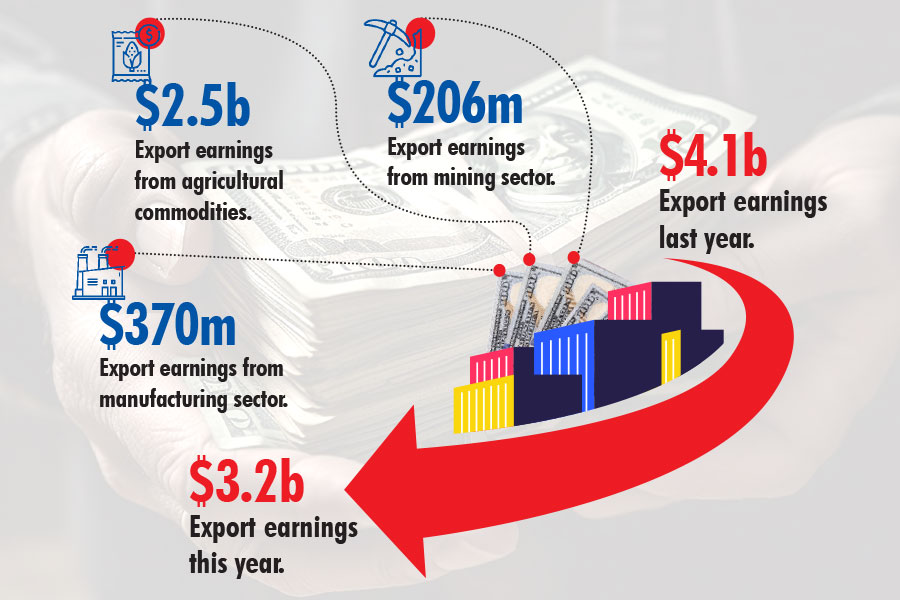
Editorial | May 13,2023
Feb 20 , 2021
By Zelalem Bezabih
There is a troubling mismatch between economic development and population growth in Ethiopia. The government should not take its eye off the imbalance and close the gap between the demand an expanding population creates and the resources that can be spent to support it, writes Zelalem Bezabih (zolalede@gmail.com), a business development and social researcher.
The power vested in the youth to drive economic development is well-founded. China and India have shown the value of the massive population. But there is something implicit in their growth: economic expansion must surpass growth in population to positively influence the country’s development.
With more than 112 million people, Ethiopia stands as the second-most populous nation in Africa. With a 2.6pc growth rate, the population is expected to double by 2050. Such a growing population can be a threat if not utilised properly, especially if the youth cannot be the means and the beneficiary of this development.
Granted, a massive population is a source of added demand and formidable consumption power contributing to an increase in a country's GDP. But this can only be true if people have spending power. In fact, with appropriate investment in human capital and infrastructure, having a large population is a blessing. It means a larger pool from where innovators can come, large market and better economies of scale.
The experience of emerging economies is that rapid population growth higher than two percent will drag on economic development. It limits a country to focus its resources on meeting the demand of a new population that would take at least a decade before it becomes productive. This is at the expense of addressing underlying macroeconomic problems in the process. But the goal of development should extend beyond the accommodation of an ever-larger population.
Thus, the line between blessing and curse is blurred. Lack of employment opportunities and the failure to optimise economic development has resulted in political revolutions, such as the Arab Spring. In Ethiopia, the socio-political experiences of the past few years are a sobering reminder that the youth have the power to make or break a country. It has shown that it can easily cancel out the country’s developments or the many efforts made to make Ethiopia an attractive investment destination.
With two-thirds of the entire population being young, the need to engage them as part of the growth process is necessary. Investment efforts can only be sustained if they centre the youth in their engagements and help empower the overall development process.
Efforts to better engage youth in economic development require multifaceted interventions from both the government and the private sector. The former takes the leading role in creating an enabling environment for the private sector to flourish. Businesses do not operate in a vacuum but in a dynamic environment that directly influences how they achieve their objectives — legal provisions and bureaucratic challenges take centre stage.
There are positive beginnings in this regard. An excellent example are the reforms by the National Bank of Ethiopia (NBE) that led to the lifting of the 27pc mandatory bond private commercial banks had to buy on every loan they made. The result has been encouraging as commercial banks loaned over a trillion birr for the first time in the past fiscal year.
In its turn, the private sector should make investment options that better respond to the potential and long-term development of the country, especially in agriculture and manufacturing. The latter will create more job opportunities and enhance the country’s export earnings.
The strength of the service sector, concentrated in urban areas, has brought an encouraging shift on the sectoral proportion of GDP to a more balanced mix. It makes up for over a third of GDP, surpassing agriculture and industry. Encouragingly, the industry is the fastest-growing of the bunch.
Prime Minister Abiy Ahmed’s (PhD) administration has recently unveiled a 10-year national development plan that hopes to address macroeconomic imbalances and support the private sector. One cannot help but be suspicious of the ongoing three-billion-dollar International Monetary Fund (IMF) programme to support the government’s economic transformation plan. It comes with prerequisites, which lead to a depreciation of the Birr and the rise in the cost of living — both of which are currently occurring in Ethiopia.
On paper, the national plan does have potential, including in reforming the financial sector and domestic revenue mobilisation. By engaging the private sector more, it hopes to address poverty, especially in rural areas, and accelerate growth.
Despite the past success in registering impressive economic development, the government has its work cut out for it. Political challenges abound, and the public is feeling the heat of economic underperformance as the cost of living rises. Sustaining economic expansion, improving institutions' capacity and policies to adapt to these changes, addressing macroeconomic and structural imbalances, and a disproportionate share of the private sector to the government's role in the economy will not be easy under such circumstances. But all of these efforts should be geared toward ensuring that there are abundant employment opportunities for the youth.
Having a massive youth population is a blessing in disguise. Packed with untapped energy and the will to storm through challenges, youth can turn their lives as well as the fortunes of a country around. They can be a source of frustration in galvanising the economic development of a country. Knowing the resources we have is one thing; more important is creating an ambient environment for them to engage in productive endeavours.
By ensuring that the youth have jobs and can contribute to the economy of the country, the government can focus its resources and attention toward taking care of the less productive segments of the country, such as the elderly. This can occur, especially if population growth is chastened. Otherwise, too high a growth will become a burden on the economy by, at the very least, increasing supply in the labour market and dragging down wages.
Today, there is a troubling mismatch between economic development and population growth. The government should not take its eye off the imbalance, closing the gap between the demand an expanding population creates and the resources that have to be spent to support it.
PUBLISHED ON
Feb 20,2021 [ VOL
21 , NO
1086]


Editorial | May 13,2023

Editorial | Jul 01,2023

Editorial | Jan 14,2023

Verbatim | Oct 23,2021

Fortune News | Jun 17,2023

My Opinion | Jul 18,2021

Viewpoints | Jan 05,2019

Fortune News | Oct 23,2021

Fortune News | Jul 01,2023

Radar | Oct 27,2024

My Opinion | 131586 Views | Aug 14,2021

My Opinion | 127942 Views | Aug 21,2021

My Opinion | 125917 Views | Sep 10,2021

My Opinion | 123541 Views | Aug 07,2021

Dec 22 , 2024 . By TIZITA SHEWAFERAW
Charged with transforming colossal state-owned enterprises into modern and competitiv...

Aug 18 , 2024 . By AKSAH ITALO
Although predictable Yonas Zerihun's job in the ride-hailing service is not immune to...

Jul 28 , 2024 . By TIZITA SHEWAFERAW
Unhabitual, perhaps too many, Samuel Gebreyohannes, 38, used to occasionally enjoy a couple of beers at breakfast. However, he recently swit...

Jul 13 , 2024 . By AKSAH ITALO
Investors who rely on tractors, trucks, and field vehicles for commuting, transporting commodities, and f...

Jun 28 , 2025
Meseret Damtie, the assertive auditor general, has never been shy about naming names...

Jun 21 , 2025
A well-worn adage says, “Budget is not destiny, but it is direction.” Examining t...

Jun 14 , 2025
Yet again, the Horn of Africa is bracing for trouble. A region already frayed by wars...

Jun 7 , 2025
Few promises shine brighter in Addis Abeba than the pledge of a roof for every family...

Jun 29 , 2025
Addis Abeba's first rains have coincided with a sweeping rise in private school tuition, prompting the city's education...

Jun 29 , 2025 . By BEZAWIT HULUAGER
Central Bank Governor Mamo Mihretu claimed a bold reconfiguration of monetary policy...

Jun 29 , 2025 . By BEZAWIT HULUAGER
The federal government is betting on a sweeping overhaul of the driver licensing regi...

Jun 29 , 2025 . By NAHOM AYELE
Gadaa Bank has listed 1.2 million shares on the Ethiopian Securities Exchange (ESX),...